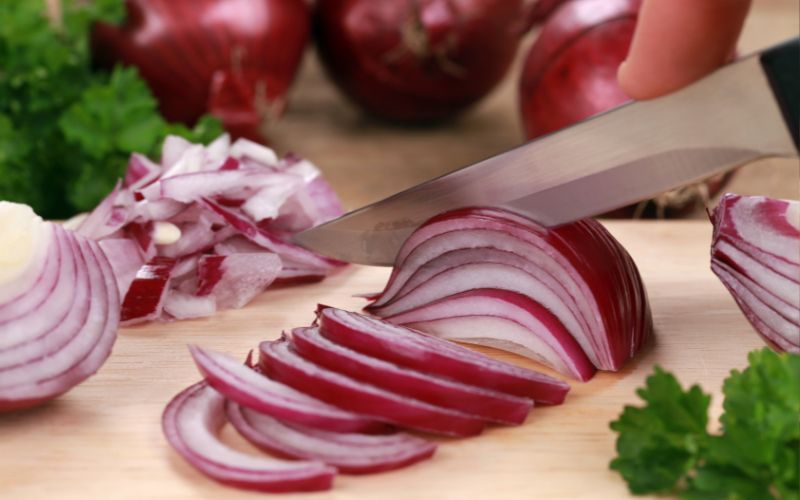Having a few onions readily available in your kitchen is always brilliant. These versatile vegetables serve as excellent culinary companions all year round. That’s precisely why we purchase them in large quantities from the supermarket, ensuring our pantries are well-stocked with those hefty mesh bags brimming with onions of various varieties. However, due to their less conspicuous signs of spoilage compared to some other vegetables, it’s entirely plausible that you may unknowingly be extending the lifespan of your onions beyond their prime.
To avoid this predicament, it is crucial to familiarize yourself with the best methods of storing onions and the corresponding duration for which they will remain fresh based on your preferred storage location. By doing so, you can ensure that your onions maintain their optimal quality, allowing you to enjoy their flavorful presence in your culinary endeavors for as long as possible.
How Long Do Whole Onions Last?
Ideally, onions should be stored in a cool, dark place at 45 to 55 degrees Fahrenheit. This specific environment helps to prolong the shelf life of whole, raw onions, allowing them to last for approximately two to three months. If you are searching for suitable locations within your home that provide these conditions, areas such as your cellar, pantry, unheated basement, or garage could be viable options.
However, finding an excellent spot like this in their homes can be challenging for many individuals. In such cases, storing onions in the refrigerator is a better alternative to maximize their shelf life. By doing so, you can expect the onions to last for at least two to three months. It is essential to remember that the texture of the onions may become slightly soft in the fridge as they tend to absorb moisture easily.
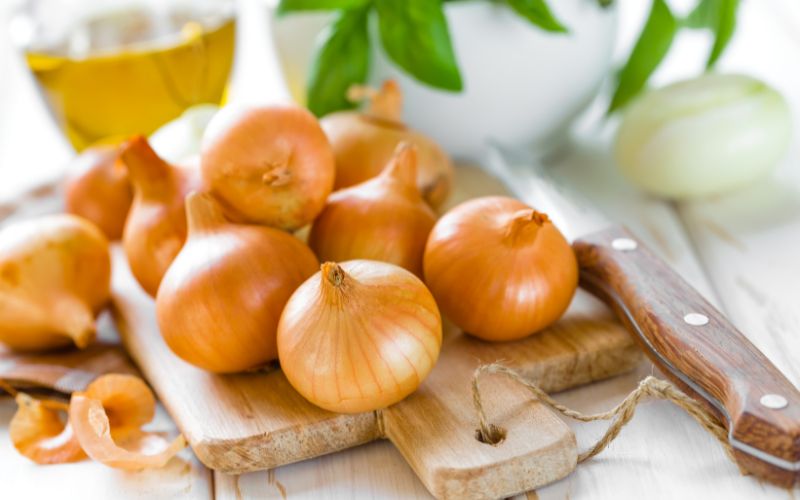
In situations where refrigerator space is limited and storing onions at room temperature is the only option available, whole, raw onions can still last for two to four weeks.
Whether you store your onions at room temperature or in a more relaxed environment, it is crucial to provide proper ventilation to prevent mold growth. This can be achieved using an open basket, mesh bag, or loosely covered paper bag. It is advisable to avoid storing onions in plastic bags as they do not allow for adequate ventilation.
Additionally, it is worth noting that potatoes should be kept away from moisture-releasing foods, including onions. Suppose you possess an heirloom potato and onion bin and are contemplating whether to keep or discard it. In that case, checking if the compartments are adequately separated and vented to prevent gases from interacting is recommended. If this is the case, you can confidently continue using the bin. However, if the compartments are not adequately separated and you notice premature sprouting of your onions or potatoes, consider updating your storage solution.
How to Store Peeled or Cut Onions?
Once an onion has been peeled, storing it in the refrigerator is highly recommended to prevent contamination. Additionally, if you have halved, sliced, or chopped raw onions, it is best to keep them refrigerated in an airtight container or a resealable plastic bag. By storing them this way, you can extend their freshness for seven to 10 days.
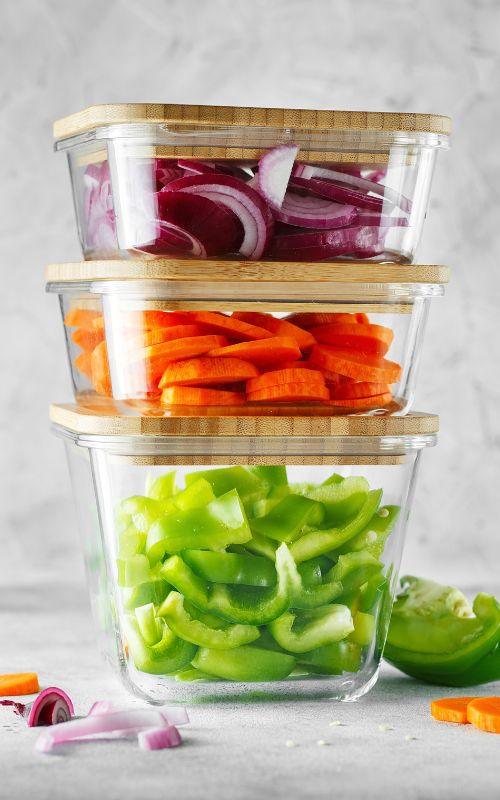
When it comes to cooked onions, it is equally important to store them in an airtight container and place them in the refrigerator. Like most leftovers, cooked onions can stay fresh for up to four days when stored in this manner.
Furthermore, refrigerating onions offers the added benefit of slowing down the enzymes responsible for triggering those unpleasant onion tears. This relaxed environment helps to alleviate the tear-inducing effects and makes your onion-prep experience a more enjoyable one.
How Long Do Onions Last in the Freezer?
That’s great news! Freezing raw onions is an excellent way to prolong their freshness and extend their shelf-life. To get started, peel the onions and then chop or slice them according to your preference. Once you have prepared the onions, you can store them in various ways to ensure optimal freezing.
For instance, you can place them in an airtight container a freezer bag, or tightly wrap them in aluminum foil or plastic wrap. Doing so creates a protective barrier that helps keep the onions fresh and prevents freezer burn. When properly stored, raw onions can last up to eight months in the freezer, giving you plenty of time to enjoy their flavor and versatility in your favorite dishes.
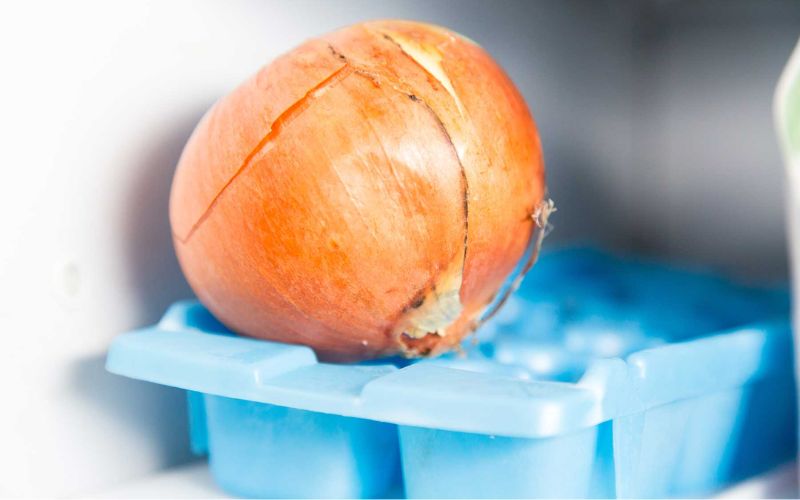
But what about cooked onions? Well, the good news continues! Cooked onions can also be frozen, allowing you to preserve their delicious taste and texture for an extended period. Like raw onions, using an airtight container or freezer bag to store the cooked onions is essential. This helps maintain their quality and prevents any unwanted odors from seeping in.
With proper storage, cooked onions can be frozen for up to 12 months, allowing you to have pre-cooked onions on hand whenever needed. So whether you plan to use them in soups, stews, or as a topping for your favorite dishes, freezing cooked onions is a fantastic way to ensure their long-term freshness and availability.
How to Tell if an Onion Is Bad or Spoiled
There are several ways to determine if your onions have gone wrong: color, feel, and smell. When onions spoil, they may develop dark spots that can grow mold. This indicates that the onions are no longer fresh and should be discarded. Another sign to look out for is if the onions have started sprouting. Sprouting means that the onions are deteriorating and no longer suitable for consumption.
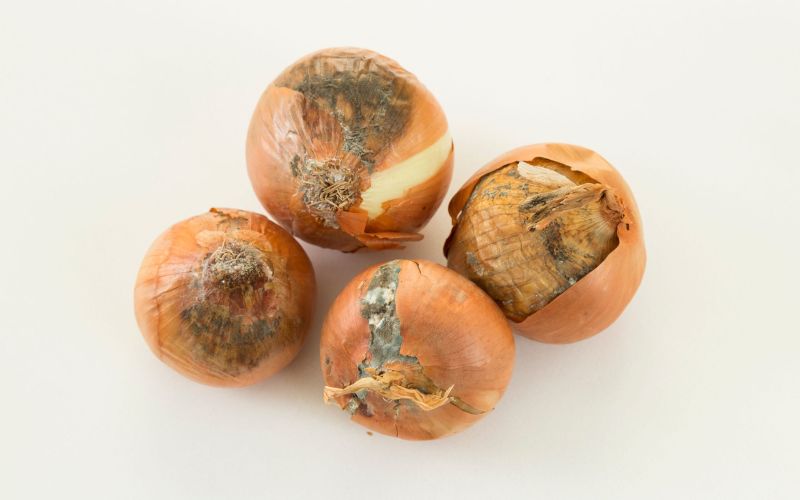
In addition to visual cues, you can also assess the freshness of your onions by touching them. If you notice any soft or mushy spots on the onions when you press them, it indicates that they are starting to go wrong.
Lastly, let’s not forget the trusty sniff test! As onions spoil, their scent will change. While raw onions might not be everyone’s favorite smell, to begin with, if your onions start emitting any odor other than their typical onion aroma, it’s a strong indication that it’s time to bid farewell to the old onions and welcome new ones into your kitchen.
Do onions last longer in the fridge or on the counter?
When it comes to the best way to store onions, there are a few factors to consider. Whole onions and shallots fare well in a cool, dry, dark, and well-ventilated room. This means that areas like the pantry, cellar, basement, or garage can be ideal for keeping them fresh and flavorful.
However, if you have peeled onions on hand, storing them in the refrigerator is generally recommended. When properly refrigerated, peeled onions can last 10 to 14 days. This relaxed environment helps slow down the onion’s natural aging process and preserve its quality for extended periods.
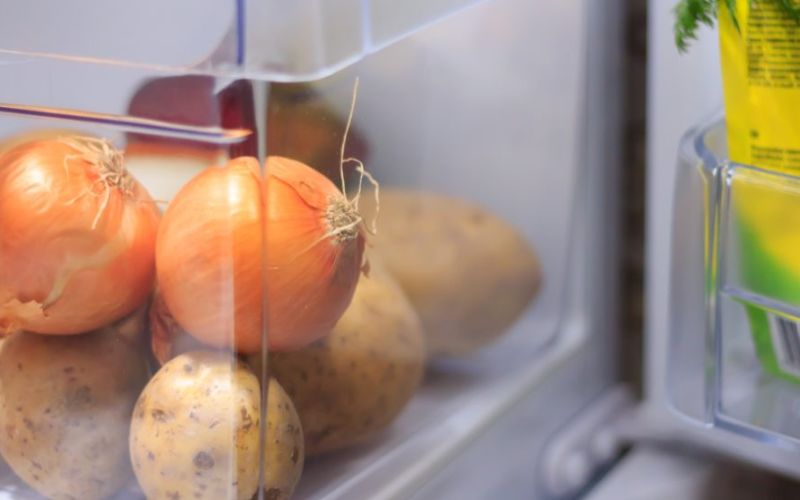
If you’ve already sliced or cut your onions, it’s best to refrigerate them as well. Sliced or cut onions can typically be safely stored in the fridge for about 7 to 10 days. Keeping them chilled can help prevent bacterial growth and maintain their taste and texture for longer.
Following these storage guidelines, you can ensure your onions stay fresh and ready to use whenever needed. Whether you store them in a cool room or the refrigerator, proper storage techniques can help extend their shelf life and minimize waste.
How long should you store onions?
When storing onions, it’s always good to know the recommended duration. The National Onion Association suggests that if you correctly keep whole onions, they can last anywhere from one to three months on average.
However, if you have cut onions, their shelf life decreases to about one to two weeks. If you prefer to freeze your onions, rest assured that chopped onions can stay fresh for approximately eight months in the freezer.
What is the best way to store onions and garlic?
The best way to store onions and garlic is to ensure they are stored properly, which can extend their shelf life. Keeping onions and garlic in a basket or paper bag is recommended, allowing sufficient air circulation.
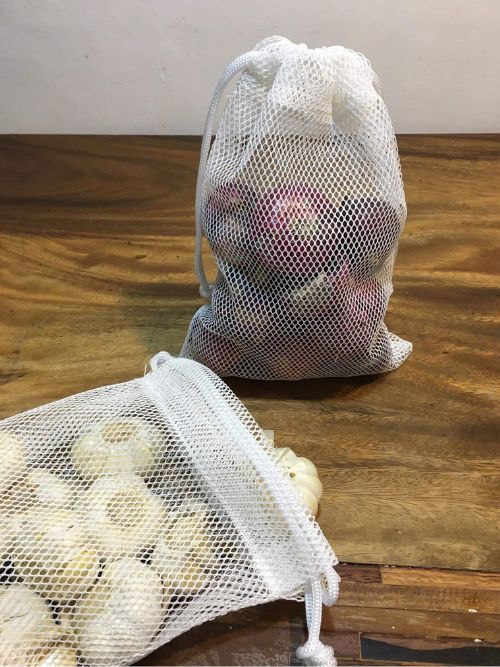
Additionally, storing them in a relaxed and dark place is essential, as exposure to light and heat can accelerate spoilage. Following these guidelines, onions and garlic can be stored for an extended period, typically 3 to 6 months. However, avoiding sealing them in plastic is crucial, as this can lead to rapid deterioration.
How do you cure onions for long-term storage?
Curing onions is an essential process that allows the outer layers of the onion to dry out and tighten gradually. As this happens, a protective wrapping surrounds the bulb, keeping it safe and secure.
Placing the onions in a shaded, dry, and fantastic location is recommended for optimal curing. This could be a shed or a covered porch, as long as it is away from direct sunlight. By doing so, the onions are shielded from excessive heat and sunlight, which could compromise the curing process.
To ensure that the onions dry evenly, it is advisable to either spread them out or hang them. This allows for proper air circulation around the bulbs, facilitating drying. When air can freely flow around each onion, it helps maintain an ideal environment for curing, resulting in perfectly dried and preserved onions.
Why onions should not be refrigerated?
There are several reasons why it is not recommended to refrigerate onions. One crucial factor to consider is the impact that refrigeration can have on the texture of the onions. When onions are cooled, the cold temperature and moisture inside the fridge can cause them to become soft and lose their natural crunchiness. This can result in onions that are soggy and less enjoyable to eat.
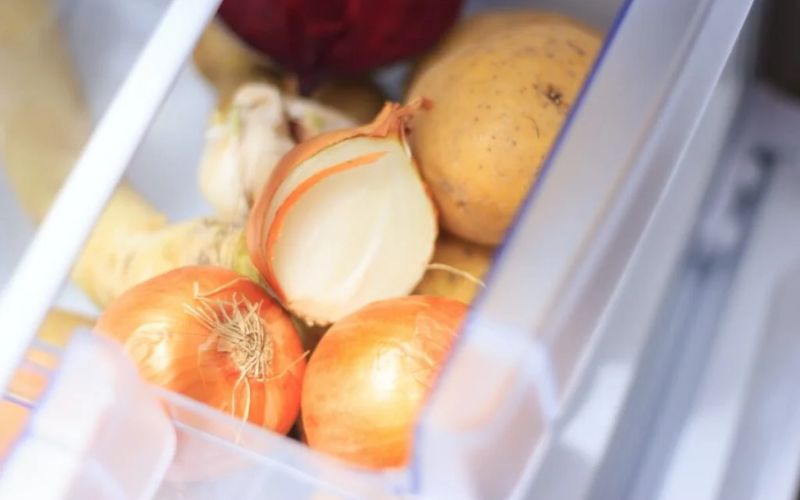
In addition to affecting the texture of the onions, refrigeration can create an environment conducive to the growth of harmful pathogens. The moisture and cold temperature inside the fridge can create the perfect conditions for bacteria to develop on the onions. This can lead to bacterial growth and increase the risk of foodborne illnesses.
Furthermore, refrigerating onions can harm their nutrient levels. The cold temperature can cause certain nutrients in the onions to degrade over time, reducing their nutritional value.
Overall, storing onions in a cool, dry place outside the refrigerator is best to preserve their texture and nutrients and reduce the risk of bacterial growth.
What is the best container for storing onions?
When storing onions, choosing a suitable container that promotes optimal freshness is essential. Whole onions should ideally be stored at room temperature to maintain their quality. A container that allows air circulation, such as a wire basket, is recommended to ensure proper ventilation.
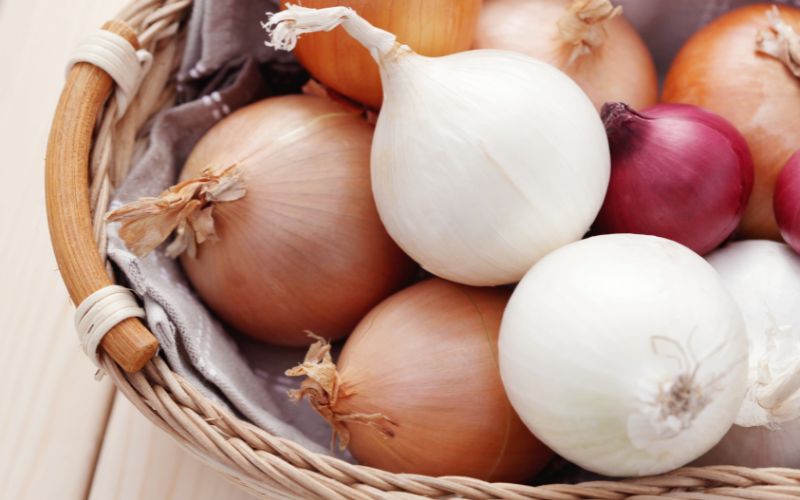
Another suitable option is a perforated plastic sack, which provides airflow while protecting the onions from excessive moisture. An open paper bag can also be a convenient storage solution, allowing the onions to breathe and retain flavor.
Regardless of the type of onion you have, whether red onions, Vidalia onions, Spanish onions, or even shallots, it is advisable to store them whole to retain freshness and taste for longer.
Can onions last 2 weeks in the fridge?
Yes, onions can last for up to 2 weeks in the fridge. However, to ensure maximum freshness, it is recommended to peel them before refrigeration. If you store them whole and unpeeled in the refrigerator, they may spoil within 7-10 days due to moisture absorption, resulting in a mushy texture.
It is best to store diced or sliced onions in the fridge for up to two weeks to preserve their flavor for extended periods. Following these guidelines lets you enjoy the optimal onion taste in your culinary creations.
Can I store onions in a plastic bag?
Storing onions in plastic bags is not recommended because the lack of air circulation can shorten their shelf life. Instead, it is best to keep onions in a well-ventilated area. When selecting onions, ensure they feel firm and dry, with no signs of gray or black mold.
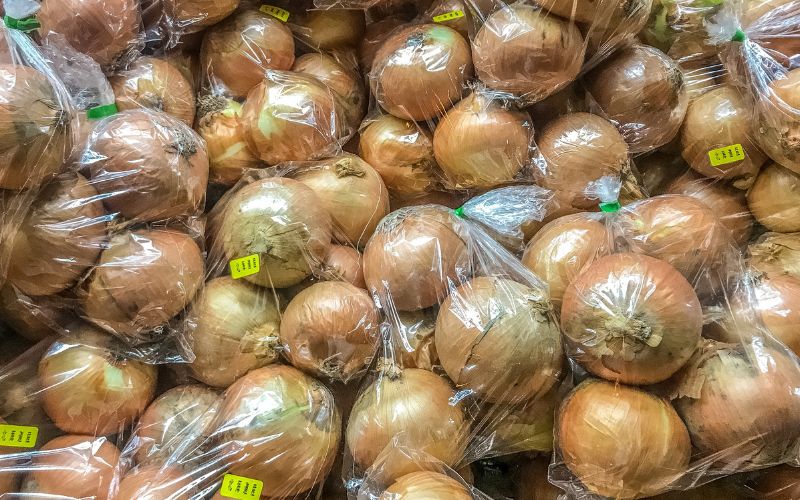
Additionally, onions should not have any visible sprouting as this can indicate that they are past their prime. These precautions will help ensure that your onions stay fresh for extended periods.
How long do unpeeled onions last in the fridge?
In general, unpeeled onions can last approximately seven to ten days when stored in the refrigerator. However, it is essential to note that various factors, such as storage conditions and methods, can influence the longevity of onions.
For instance, if you chop the onions before refrigerating them, proper storage techniques become crucial in ensuring their freshness. Additionally, if you prefer to store onions in the freezer, they can maintain their quality for approximately six to eight months.
Can I freeze onions raw?
Yes, you can freeze raw onions. Freezing onions helps preserve their freshness and flavor for extended periods. By freezing them, you can conveniently have onions on hand whenever you need them without worrying about them spoiling.
To freeze raw onions, peel and chop them according to your preference, then place the chopped onions in an airtight container or freezer bag. Label the container with the date and store it in the freezer.
When ready to use the frozen onions, you can thaw them in the refrigerator or use them directly in your cooking without thawing. Frozen onions work well in soups, stews, stir-fries, and many other recipes.
Can you store onions in a cotton bag?
Yes, you can store onions in a cotton bag. Using 100% organic cotton mesh bags is an excellent option for storing unpeeled onions. These bags are not only breathable but also washable and reusable.
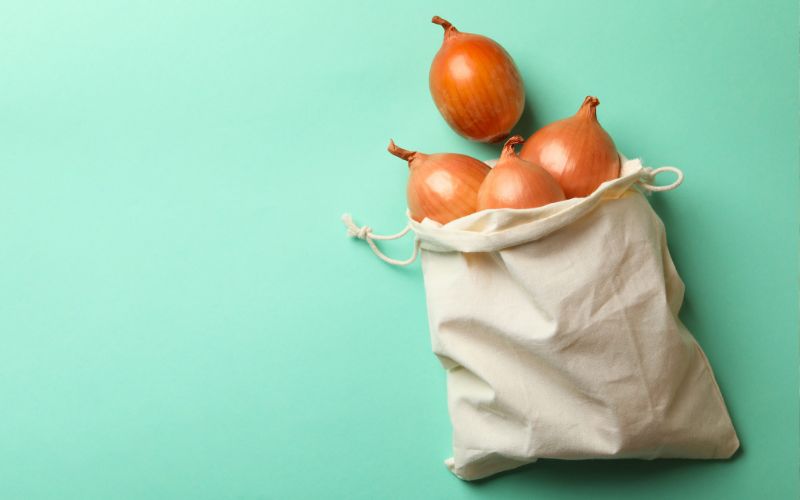
They provide the necessary airflow to keep the onions fresh, whether you choose to store them at room temperature or inside a refrigerator. So, go ahead and give cotton bags a try for your onion storage needs!
How do you store onions in a cardboard box?
To properly store onions in a cardboard box, it is essential to prioritize good ventilation. If you purchase onions that come packaged in a plastic bag, it is highly recommended to promptly remove them from the bag as soon as you arrive home.
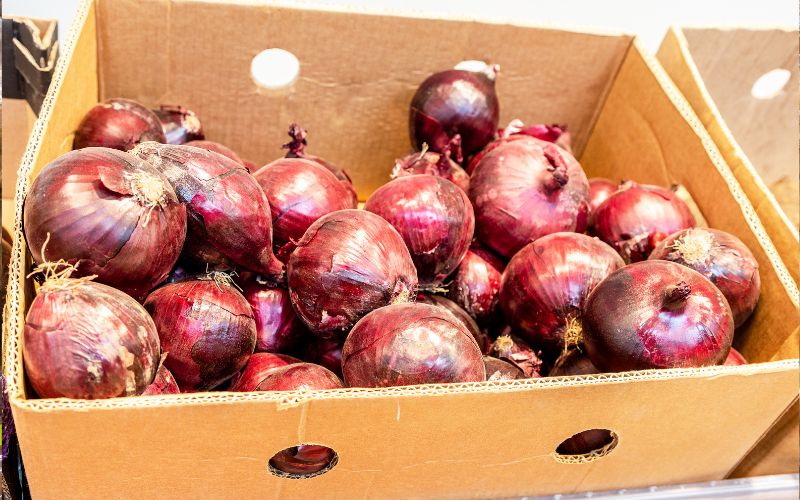
Instead, opt for a more breathable alternative, such as a paper bag, basket, or, as previously mentioned, a cardboard box. By choosing one of these options, you are allowing for improved airflow around the onions.
Additionally, when placing the onions inside the box, it is crucial to stack them loosely. This arrangement ensures ample space for air to circulate freely and maintain the onions’ freshness for extended periods.

